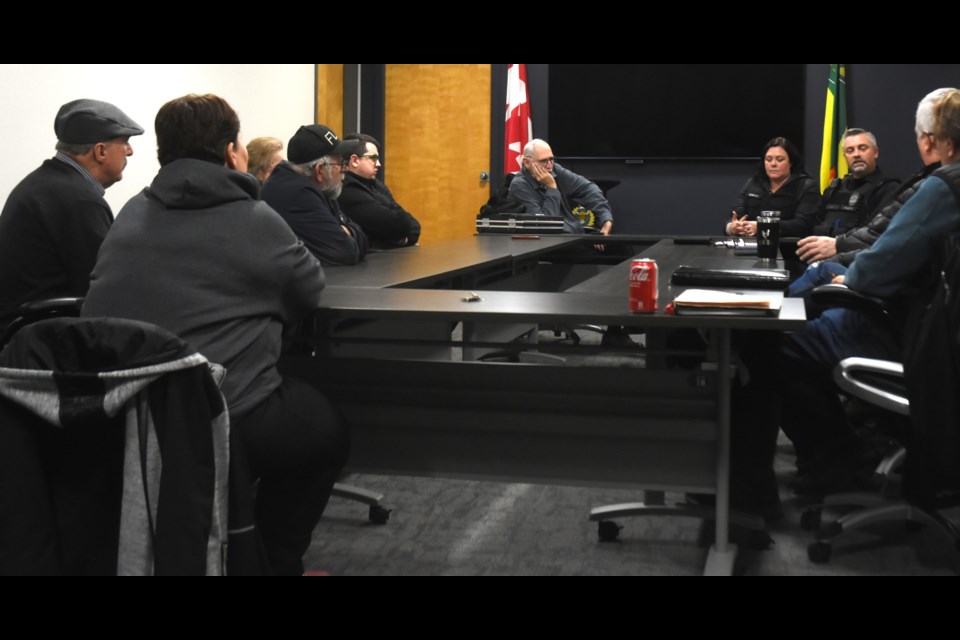MOOSE JAW — Moose Jaw Crime Stoppers had another good year in 2024, as it received 58 more tips that led to one more arrest than the year before, data show.
The non-profit organization received 214 tips last year, which led to police arresting nine people, laying five charges and recovering $35,000 worth of property. Those tips allowed the organization to pay our $800 in rewards.
“It was a good year. We got a lot of good tips and helped the police to solve some crimes … ,” Lyle Johnson, chairman of the Crime Stoppers board, said after the group’s recent annual general meeting. “The Crime Stoppers board certainly helped them to be successful, so we’re happy.”
Johnson appreciated the financial support that the group received from organizations such as the Association of Canadian Travellers (ACT/UCT) Council 1027, the Kinsmen Club of Moose Jaw and the Early Bird Lions Club. This year, the Lions Club donated $800 and ACT/UCT donated $2,000.
“Without that funding, we wouldn’t exist,” he added.
The Crime Stoppers AGM featured presentations by members of the Moose Jaw Police Service’s (MJPS) Police and Crisis Team (PACT) and Acting Chief Rick Johns.
Johnson thought it was good for board members to hear from a PACT unit because they learned that quality people are supporting the community’s downtrodden.
“These (PACT) people care about their jobs (and) they care about the people they work with … so we’re happy to have those quality people on our force,” he added.
Acting chief presentation
Johns — also the deputy chief — said he created a business case in 2018 to acquire provincial funding to create the Police and Crisis Team units, and since then, funding from the province and Saskatchewan Health Authority has kept the two two-person units operational.
“There’s been a lot of positive feedback with … the teams,” he said. “In fact, I’m going to brag a little bit because the people we’ve had in these units have done a wonderful job, to the point where we’ve somewhat become a model as to how a PACT unit should be running.
“… It’s one of our flagship programs, as far as I’m concerned.”
Johns then discussed the preliminary crime statistics for 2024, which showed that, versus 2023, total crimes against the person decreased by 5.3 per cent, total crimes against property declined by 23.3 per cent, and calls for service jumped 3.6 per cent.
The deputy chief said that when he started in 1998, the MJPS was receiving roughly 13,000 calls annually, but that number was now over 20,000. He pointed out that these are not all crimes but are more “social disorders” and residents’ personal crises that the PACT is attempting to address.
“We are (operational) 24/7 while other places aren’t, so when they (struggling people) need assistance, generally, we’re the first call,” he added.
The MJPS does more with fewer people, while those members are forced to take on many different responsibilities, said Johns. However, even though it is understaffed, last year, it had the highest clearance rate for resolving crimes in Saskatchewan.
The agency has an authorized strength of 64 officers — it currently has 58 members — although that number will increase to 72 with the eight provincially funded positions, he continued. The organization is implementing recruiting strategies, while it will fight with other agencies for training seats at the Saskatchewan Police College.
Recruiting is difficult, though, as the MJPS usually receives about 40 applications a year, whereas when Johns began working, it received over 400 submissions annually. He thought there had been a societal change where people now saw policing as a thankless job with long hours.
As for the creation of a community warming space, Johns said the Ministry of Social Services is responsible for people’s housing needs, although, in general, homelessness was a problem for everyone, including the police, SHA, social services and city hall.
It's difficult to say who’s responsible for creating a warming space, he added, although it will take a collaborative approach since the community will go farther by working together.




